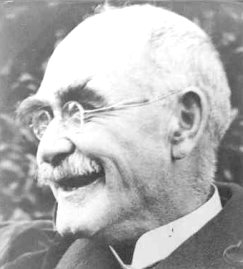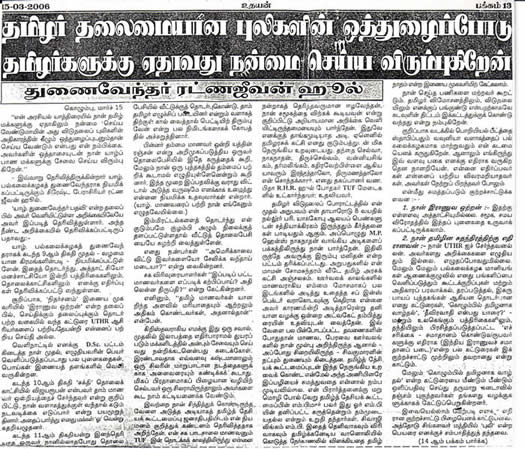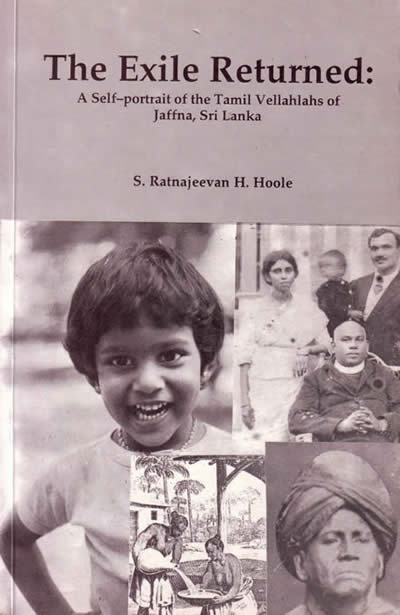Professor Jeevan Hoole Meets Poet Rudyard Kipling
by Sachi Sri Kantha, December 21, 2010
|
While the Tamil Christian community has contributed in proportion to their numbers more than their share towards the Tamil cause, there are a few Christians who, unable to reconcile their minds to the fact that they had deserted the religion of their forefathers. This grievance they carry against the whole community... As for Ratnajeevan Hoole as Vice Chancellor of Jaffna University, this much has to be said. This man is dangerous. He should not be allowed to roam free in Jaffna’s Tamil Hindu society, particularly in the university campus where there is even a Saiva temple. |
Toadyism seems rampant among Tamils everywhere. The word ‘toadyism’ is a derivative from toady (noun), which the New Oxford American Dictionary (2001) describes as “a person who behaves obsequiously to someone important” in page 1779.
 |
| Poet Rudyard Kipling (1865-1936) |
How many have read this short news report, which appeared in the Sunday Observer (Colombo), datelined December 5, 2010, with the headline ‘Jaffna Don comes down hard on Oxford Union?’ It was written by Ananth Palakidnar, and provides a good example of what toadyism means.
“President Mahinda Rajapaksa should not have been prevented from addressing the Oxford Union. A university means, an institution of ideas. Therefore, the President should have been allowed to speak instead of preventing him from addressing the Oxford Union Forum according to Dr. Ratnajeevan Hoole, one of the contenders for the post of the Vice Chancellor of the University of Jaffna.
Dr. Ratnajeevan Hoole was elected as the Vice Chancellor of the University of Jaffna in 2006. However, he had to withdraw from the post due to the threats to his life and his family members by the LTTE. Dr. Hoole commenting on the Oxford issue in London last week told the Sunday Observer that the Universities are places of learning and independent thinking.
Therefore, ‘President Rajapaksa in his capacity as a Head of State should not have been prevented from addressing the Oxford Union. He should have been allowed to address the Forum and the audience could have come out with questions’. Dr. Ratnajeevan Hoole said that two of his brothers, Dr. Rajan Hoole and Dr. Paul Hoole were products of the University of Oxford.
Dr. Ratnajeevan Hoole is in the fray for the post of Vice Chancellor of the University of Jaffna after four years. Commenting on Jaffna after the LTTE was defeated Dr. Hoole said, that he could see the difference. ‘Following threats to my family and self from the LTTE, I lived in the United States for the past four years. I have been living in Jaffna for the past three months. The North under the grip of the LTTE was terrible. Everyone was living under pressure and intimidation. The terrorist outfit did not allow people in the North to think or act freely. However, with the fall of the outfit, there is a vast change in the day-to-day life of the people in the North. Essential food and services are flowing freely into the peninsula. The political parties are functioning freely. Hence, I see the light at the end of the tunnel like others in Jaffna,’ Dr. Hoole said.”
Holy cow! So, it seems that Prof. Jeevan Hoole is back in Jaffna, as a contender for the post of the Vice Chancellor of the University of Jaffna! Four years ago, when he was appointed by President Mahinda Rajapaksa, he couldn’t land in Jaffna. And he had issued drooling statements from Colombo about his intention to serve and do good for the Jaffna community, with the cooperation of the LTTE leadership. For proof, I provide two scans from the Uthayan newspaper, dated March 15, 2006.

 Then, when things turned too hot to handle, he copped out a plea that LTTE elements were out to kill him and his family members, and escaped from the island through the back door. In Tamil, there is a humorous idiom for this sort of behavior from the perspectives of a beggar: ‘Pitchai Vendaam- Naayai Pidi’ (I don’t need any alms. Will you care to catch the dog?). Then, when things turned too hot to handle, he copped out a plea that LTTE elements were out to kill him and his family members, and escaped from the island through the back door. In Tamil, there is a humorous idiom for this sort of behavior from the perspectives of a beggar: ‘Pitchai Vendaam- Naayai Pidi’ (I don’t need any alms. Will you care to catch the dog?).
Now, to get back the post for which he was offered four years ago, Prof. Hoole is back again, in a toady relationship with President Rajapaksa. A mustachioed macho guy who would not permit any freedom of speech or rights for the thousands of Tamil families in the North and East to mourn their dead kith and kin, by overseeing the demolition of War Heroes Cemeteries is being propped up by this toady Professor Ratnajeevan Hoole. And he also brags that two of his siblings were “products of the University of Oxford”. As far as I was informed, Dr. Rajan Hoole was an external candidate for the Ph.D. degree at the University of Oxford. There is some difference between the internal student and the external candidate! A little bit of resume embellishment here, at the expense of Oxford. One should care to ask, whether ‘identity theft’ as practiced by Dr. Rajan Hoole for long (read below), was also an Oxford tradition.
I’m reminded of poet Rudyard Kipling’s 1894 long poem ‘The Song of the Banjo’. Though the poem has 96 lines, I selectively provide below only 16 lines, which somehow fits the mood in which Prof. Hoole lives.
I’m the Prophet of the Utterly Absurd,
Of the patently impossible and vain –
And when the thing that couldn’t has occurred
Give me time to change by leg and go again.
With my ‘Tunka-tunka-tunka-tunka-tunk!’
(So the lights – the London Lights – grown near and plain!)
So I rowel’em afresh towards the Devil and the Flesh
Till I bring my broken rankers home again.
With my ‘Plunka-lunka-lunka-lunka-lunk!’
Here’s a trifle on account of pleasure past,
Ere the wit that made you win gives you eyes to see your sin
And – the heavier repentance at the last!
With my ‘Tinka-tinka-tinka-tinka-tink!’
(What d’ye lack, my noble masters! What d’ye lack?
So I draw the world together link by link
Yea, from Delos up to Limerick and back!
On the academic qualities of Prof. Ratnajeevan Hoole as a Hinduism scholar-impostor, late S. Sivanayagam wrote a pungent, hard-hitting editorial in April 07, 2006, which deserves a re-reading now. It was captioned: “Who is this man called Ratnajeevan H. Hoole? Here is an introduction to the man inside out!” Here it is:
“As everyone knows this man’s name figured recently when President Rajapakse in his infinite wisdom thought he would make a good Vice-Chancellor for the Jaffna University. Thank the Lord Jesus (Ratnajeevan is a Christian fundamentalist) he never showed his face anywhere near Jaffna. He is also a sexually obsessed individual. But what is much worse, he is a determined rubbisher of the Hindu faith. These are not idle statements made without any proof. A book he himself wrote gives all these away.
He published a book titled – The Exile Returned: A self-portrait of the Tamil Vellahlahs of Jaffna, Sri Lanka. The address given was Institute of Fundamental Studies, Kandy, Sri Lanka and Harvey Mudd College, Claremont, CA 91711, USA. The publication date was Colombo, 1997. It was printed at Bodhimoha Print House, Ethul Kotte and published by Aruvi Publishers of 88F 1/1, Galle Road, Dehiwala. Inquiries about the book could be had he says from there or from S.R.H. Hoole, 36, Sagara Road, Colombo 4. Tel: 94-1-596 684. The book is dedicated to ‘The Little Children of Jaffna’. These details are given not because we expect our readers to jump up and make inquiries about the book. Please don’t. Anyway the book is in faded print and the publishers themselves appear to have left this earth. Preserve your sanity. The purpose is only to give authenticity to whatever is said here.
But grant it to the man, he had done a lot of painstaking research during his life in America into Aryan Brahminical agamas and Vedas. Why did he do it? Because he thought that is the only way he could scrape enough evidence to discredit the Hindu faith.
This man has a streak of eccentricity, but that is his problem. He is a Christian fundamentalist, but that too is his privilege. He has a lot of sex thoughts in his head, but even that is his problem. The mistake he makes is in making various sex allusions in a book he says is ‘dedicated to the little children of Jaffna’. Katubedde in Moratuwa where Tamil students went to study engineering was a terrible place he says. ‘There were senior Tamil boys masturbating and walking about ‘ (page 84). ‘There was a boy washing his genitals with the disinfectant Dettol because he had just visited one of the houses of ill repute’ (same page). He talks of men recently out of Jaffna ‘behaving like cows let loose. The women too now seemed not to be different’ (page 96). He says somewhere that Tamil youths (meaning Hindus of course) go about molesting women’s breasts during the annual Vel festival in Colombo. Sex, sex habits, sex behavior, are all universal traits not discovered by Professor Hoole through his research, nor are they peculiar to Tamil Hindus only, but what is nauseating is the pleasure the man derives from talking about them with the Hindus always in mind.
His real viciousness shows when he ridicules the Hindu faith. He writes, ‘The temple was more than a place of worship. Once had been the time when the temple with the dancer-prostitutes, was a place teeming with sexuality and drug use. There exists extensive quotations from the secular newspaper Jaffna Freeman on the robbery and violence including rape, accompanied by opium use in the 1860s around the Nallur and Maviddapuram Temples, especially at festival time.’ He talks of the Chief Priest of the historic Koneswaram temple Vijageswara Sarma who had ‘allegedly’ strangled his wife Ambiga. ‘According to the evidence led Sarma had immediately gone to the temple to do the poojas as usual. His assistant, the witness Venkadaraman Balamurali then ‘had asked the suspect whether the poojas could be performed after murdering a person. The reply was that it could be done after a bath” What happened to the case, whether the priest was found guilty and convicted or whether it was someone else who did the murder were all not mentioned by Hoole.
If this Hoole has a diseased mind, the other Hoole, Rajan Hoole is a political fraud. He began issuing reports under the name of ‘University Teachers of Jaffna’, while being holed up (sorry, holed up) in some secret location in Colombo. In the name of talking of human rights he began to malign the LTTE. The late Vice Chancellor of the Jaffna University, the much-respected Professor Thurairajah once issued a public statement denying the existence of such an organization and that Rajan Hoole was not a member of the University staff in Jaffna. But the Colombo press continued to give wide publicity to Hoole’s reports because it suited them. Why should they be interested in knowing the truth? After all any Tamil who undermines his own community’s interests automatically becomes a Sinhala hero.
While the Tamil Christian community has contributed in proportion to their numbers more than their share towards the Tamil cause, there are a few Christians who, unable to reconcile their minds to the fact that they had deserted the religion of their forefathers. This grievance they carry against the whole community. The Hoole brothers, Lakshman Kadirgamar and D.B.S. Jeyaraj of Canada belong to this category. As for Ratnajeevan Hoole as Vice Chancellor of Jaffna University, this much has to be said. This man is dangerous. He should not be allowed to roam free in Jaffna’s Tamil Hindu society, particularly in the university campus where there is even a Saiva temple.” [Oru Paper, London, April 7, 2006, p. 6].
The book ‘Exile Returned’ authored by Prof. Hoole in 1997, is a nasty piece of anti-Hindu drivel and had a deceptive subtitle. The word ‘Christian’ have been consciously omitted here. Instead of ‘A self-portrait of the Tamil Vellahlahs of Jaffna, Sri Lanka’ it would have been more appropriate if it was titled, A self-portrait of the Tamil Christian of Jaffna, Sri Lanka’. Though I don’t care to provide a review of this nasty work, I wish to mention something more for the record.
I n its preface, Prof. Hoole provides this paragraph about its content. “Although written in the form of a novel, a novel this book really is not. The format is adopted so that the many shades of Ceylon Tamil character in evidence in Sri Lanka and abroad may be brought out. This format also lightens the reading compared to the alternative presentation of the material as a formal sociological essay. Anything of a plot is really to have the excuse to work incidents of anthropological significance. The book can therefore be read continuously or here and there in several sittings.” n its preface, Prof. Hoole provides this paragraph about its content. “Although written in the form of a novel, a novel this book really is not. The format is adopted so that the many shades of Ceylon Tamil character in evidence in Sri Lanka and abroad may be brought out. This format also lightens the reading compared to the alternative presentation of the material as a formal sociological essay. Anything of a plot is really to have the excuse to work incidents of anthropological significance. The book can therefore be read continuously or here and there in several sittings.”
Because of this unusual hodge-podge hybrid format, the book has a bibliography of 98 items and 651 footnotes. But there is no index at all. Unfortunately, Prof. Hoole is neither a Kothamangalam Subbu (1910-1974) nor an Edmund Leach (1910-1989). Both Kothamangalam Subbu and Edmund Leach, whose birth centenaries fall this year were authorities in their specialist genre. Subbu wrote a superb Tamil novel, Thillana Mohanambal, which covered the same themes (Hinduism, temple, sexuality and sexual mores) touched by Hoole, which was later made into a movie starring Sivaji Ganesan and Padmini in lead roles. Edmund Leach, a reputed British social anthropologist, conducted field work in Ceylon and covered the same themes on sexuality among Hindus and Sinhalese and social mores. Prof. Hoole attempted to work the magic of Subbu and Leach concurrently, and fell flat on his face.
I did purchase a copy of this book, and provide a scan of its front cover nearby. A check on the bibliography listed in it shows the impoverishment of Prof. Hoole’s lack of depth of his knowledge about Hindu faith. It appears that he hasn’t touched Hindu philosopher Sarvepalli Radhakrishnan, the works of Mahatma Gandhi and Jawaharlal Nehru, or even poet Kannadasan’s elementary Arthamulla Indu Matham (Meaningful Hinduism) series. As for Prof. Hoole’s references and citations to Hinduism as practised in Eelam, the less said the better. No mention is made of Mudaliyar C. Rasanayagam (Ancient Jaffna, 1926), Rev. James Cartman (Hinduism in Ceylon, 1957) and M.D. Raghavan (Tamil Culture in Ceylon- a general introduction, 1971).
Future seems interesting to us to see how deep this toady professor will bend his neck to lick the sandals of a Sinhalese politician-despot.
*****
|  Home
Home Archives
Archives

 Then, when things turned too hot to handle, he copped out a plea that LTTE elements were out to kill him and his family members, and escaped from the island through the back door. In Tamil, there is a humorous idiom for this sort of behavior from the perspectives of a beggar: ‘Pitchai Vendaam- Naayai Pidi’ (I don’t need any alms. Will you care to catch the dog?).
Then, when things turned too hot to handle, he copped out a plea that LTTE elements were out to kill him and his family members, and escaped from the island through the back door. In Tamil, there is a humorous idiom for this sort of behavior from the perspectives of a beggar: ‘Pitchai Vendaam- Naayai Pidi’ (I don’t need any alms. Will you care to catch the dog?). n its preface, Prof. Hoole provides this paragraph about its content. “Although written in the form of a novel, a novel this book really is not. The format is adopted so that the many shades of Ceylon Tamil character in evidence in Sri Lanka and abroad may be brought out. This format also lightens the reading compared to the alternative presentation of the material as a formal sociological essay. Anything of a plot is really to have the excuse to work incidents of anthropological significance. The book can therefore be read continuously or here and there in several sittings.”
n its preface, Prof. Hoole provides this paragraph about its content. “Although written in the form of a novel, a novel this book really is not. The format is adopted so that the many shades of Ceylon Tamil character in evidence in Sri Lanka and abroad may be brought out. This format also lightens the reading compared to the alternative presentation of the material as a formal sociological essay. Anything of a plot is really to have the excuse to work incidents of anthropological significance. The book can therefore be read continuously or here and there in several sittings.”